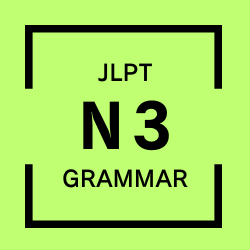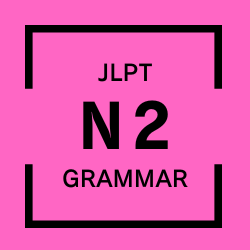例文
お金こそないが、それなりに楽しく生きています。
I have no money, but I am enjoying life in my own way.
意味・用法
「~こそ~が」は、あることを認めつつもそれと対立する内容を述べたいときに使われます。
英語 although, but
”~koso ...ga" is a phrase used to admit one aspect while simultaneously stating something that contradicts it.
詳しい文法解説 grammar point
▷ 使われ方
この文型の「こそ」は「は」に言い換えることもできますが、「こそ」は、それが特筆すべき内容である場合に使われやすい。また、「が」の代わりに「けれど、けれども」なども使われます。
1. この冷蔵庫は傷こそいくつかついているが、動作は全く問題ありません。
This refrigerator has a few scratches but works perfectly fine.
2. 今の仕事は休みこそあまりないけれど、給料はいいので満足している。
My current job doesn't offer much time off, but the pay is good, so I'm satisfied.
接続 formation
N こそ ~ が
V(ます) こそするが
ナadj (な) でこそあるが
関連文法 related grammar

~からこそ
- JLPT N2/N3 Grammar

~てこそ
- JLPT N2 Grammar

~ばこそ
- JLPT N1/N2 Grammar

~こそすれ
- JLPT N1 Grammar
例文 example sentences
・ここにある野菜は見た目こそ悪いが、味は普通のものと変わらずとてもおいしいんです。
The vegetables here look bad, but taste very good, just like regular ones.
・彼は成績こそ良くないが、性格は明るくていい子なんです。
He doesn't get good grades, but he has a nice, bright personality.
・この食べ物は臭いこそよくないが、味は格別だ。
This food does not smell good, but it tastes exceptional.
・時間こそ遅れたが、きちんとレポートを完成させて提出することはした。
I was late, but I completed and submitted the report properly.
・大学を卒業して就職こそしなかったが、別に毎日ニートのような生活をしているわけではない。
I didn't find a job after graduating from college, but I don't live like a NEET every day.
・この傷は痛みこそあるが、病院に行くほどのものではないだろう。
This wound is painful, but probably not enough to warrant a trip to the hospital.
・会えば話しこそするが、彼と別に仲がいいというわけでもない。
I talk to him when I see him, but I am not particularly close to him.
・このアパートは外観こそ少々古いですけれど、中はリフォームされて綺麗になっています。
This apartment is a little old on the outside, but the inside has been remodeled and is beautiful.
・あそこのホテルは値段こそ少々張るけれども、その値段を払うだけの価値は十分にあります。
The hotels there are a bit pricey, but well worth the price.

If you have any questions about this grammar, please comment below.
